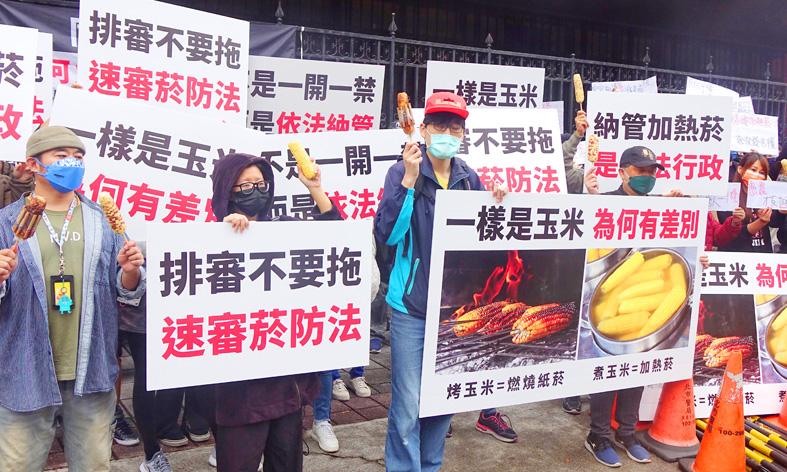Smoker rights groups yesterday protested outside the legislature in Taipei against a proposal to ban e-cigarettes.
Holding signs that read: “Consumers have rights, too,” “Give me the freedom to choose” and “Do not force me to smoke cigarettes,” protesters said the government should not impose a blanket prohibition against e-cigarettes and heated tobacco products (HTPs).
The government must respect the rights of smokers, they said, adding that it should offer people choices, instead of instituting an outright ban.

Photo: Liu Hsin-de, Taipei Times
The protest was in response to the legislature’s Social Welfare and Environmental Hygiene Committee considering changes to the Tobacco Hazards Prevention Act (菸害防制法) that would ban e-cigarettes and limit HTPs. Amendments to the Narcotics Hazard Prevention Act (毒品危害防制條例) to restrict e-cigarettes are also be considered by the Judiciary and Organic Laws and Statutes Committee.
One protester said that vaping devices, HTPs and flavored cigarettes should be regulated like regular cigarettes, with taxes and age restrictions for purchase.
“HTPs and e-cigarettes should be classified as tobacco products, just like the cigarettes sold at convenience stores,” said the protester, who asked that their name not be used. “We agree that the government should impose restrictions and rules, not permit sale to minors, no advertising, no online purchase and have health warnings.”
Separately, while discussing amendments to the Narcotics Hazard Prevention Act at the legislature, Deputy Minister of Justice Tsai Pi-chung (蔡碧仲) was asked about recent calls by advocates urging the government to permit medicinal cannabis.
Tsai said there is no plan to decriminalize cannabis, which remains classified as a category 2 narcotic.
Tsai said the judiciary is cracking down on all illegal drug use, including cannabis, and said it is illegal in Taiwan for YouTubers to post videos teaching how to grow marijuana.

‘DENIAL DEFENSE’: The US would increase its military presence with uncrewed ships, and submarines, while boosting defense in the Indo-Pacific, a Pete Hegseth memo said The US is reorienting its military strategy to focus primarily on deterring a potential Chinese invasion of Taiwan, a memo signed by US Secretary of Defense Pete Hegseth showed. The memo also called on Taiwan to increase its defense spending. The document, known as the “Interim National Defense Strategic Guidance,” was distributed this month and detailed the national defense plans of US President Donald Trump’s administration, an article in the Washington Post said on Saturday. It outlines how the US can prepare for a potential war with China and defend itself from threats in the “near abroad,” including Greenland and the Panama

The Chinese Nationalist Party (KMT) is maintaining close ties with Beijing, the Democratic Progressive Party (DPP) said yesterday, hours after a new round of Chinese military drills in the Taiwan Strait began. Political parties in a democracy have a responsibility to be loyal to the nation and defend its sovereignty, DPP spokesman Justin Wu (吳崢) told a news conference in Taipei. His comments came hours after Beijing announced via Chinese state media that the Chinese People’s Liberation Army’s Eastern Theater Command was holding large-scale drills simulating a multi-pronged attack on Taiwan. Contrary to the KMT’s claims that it is staunchly anti-communist, KMT Deputy

RESPONSE: The government would investigate incidents of Taiwanese entertainers in China promoting CCP propaganda online in contravention of the law, the source said Taiwanese entertainers living in China who are found to have contravened cross-strait regulations or collaborated with the Chinese Communist Party (CCP) could be subject to fines, a source said on Sunday. Several Taiwanese entertainers have posted on the social media platform Sina Weibo saying that Taiwan “must be returned” to China, and sharing news articles from Chinese state media. In response, the Mainland Affairs Council (MAC) has asked the Ministry of Culture to investigate whether the entertainers had contravened any laws, and asked for them to be questioned upon their return to Taiwan, an official familiar with the matter said. To curb repeated

Myanmar has turned down an offer of assistance from Taiwanese search-and-rescue teams after a magnitude 7.7 earthquake struck the nation on Friday last week, saying other international aid is sufficient, the National Fire Agency said yesterday. More than 1,700 have been killed and 3,400 injured in the quake that struck near the central Myanmar city of Mandalay early on Friday afternoon, followed minutes later by a magnitude 6.7 aftershock. Worldwide, 13 international search-and-rescue teams have been deployed, with another 13 teams mobilizing, the agency said. Taiwan’s search-and-rescue teams were on standby, but have since been told to stand down, as